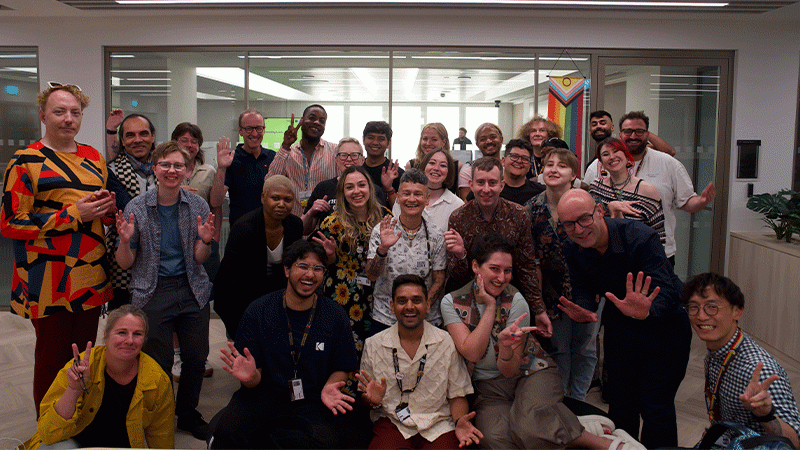The University of Westminster’s Little Titchfield Street site hosted the third edition of Westminster Conversations: Queering Academia, an event exploring the intersections of queerness, education and institutional transformation to work towards a level playing field for the LGBTQ+ community.

The conference was hosted by the Vice-Chancellor's Office, University’s Q+ Network and Equality, Diversity and Inclusion (EDI) Team. EDI Officer Rajat Shah, Senior Mentoring Officer Mariia Kogan, and Deputy Vice-Chancellor of Global Engagement and Employability and Co-Chair of the EDI Committee Professor Dibyesh Anand welcomed attendees with messages affirming the University’s commitment to EDI.
Students from the LGBT+ Empowerment Programme led an icebreaker and participants played Queer Bingo and Trivia, which helped to establish community and was an engaging way to build connection.
This was followed by a panel discussion chaired by Mariia Kogan, titled Building Queer Careers in Higher Education. The panel featured diverse voices including Rosette Jäminki, Advice Caseworker at the University of Westminster’s Students’ Union (UWSU), Drew Simms, Lukasz Konieczka and Dr Ope Lori, each offering insights into navigating queerness within academic and institutional landscapes. Panellists addressed challenges like institutional homophobia, intersectional marginalisation and the emotional labour involved in advocacy. They also shared strategies for resilience, collective organising and joy. Konieczka’s spoke about his experience working across educational and charity sectors, and Jäminki reflected on fighting stigma through both policy and personal engagement.
Representatives of key community organisations such as Udochi Adiukwu from the sexual health charity NAZ and Wafi Ahmed from NAZ’s partner organisation SASH also delivered talks, highlighting the importance of sexual health advocacy for marginalised communities and different initiatives specially for LGBTQ+ communities with Asian backgrounds. Kam Khan from the global initiative Pride in Education stressed the need for inclusive curricula in schools and universities as well as funding and projects that help communities. Lastly, Steph Elhaddad from the community-led organisation Blossom LGBT shared strategies for grassroots engagement and building safe spaces for young queer people. These presentations bridged academic theory and grassroots action, reminding attendees that queering academia is also about staying rooted in lived struggle and supporting communities.
After lunch, Professor Anand and Tim Roca, MP and ex-colleague at Westminster, led a keynote session titled Leading While Queer, reflecting on leadership, vulnerability and visibility. Roca, a longstanding LGBTQ+ public figure, spoke on pushing for legislative change while resisting performative allyship. Professor Anand stressed the importance of intersectional leadership that acknowledges both privilege and marginalisation. He said: “To lead while queer, queer spaces can never be about uniformity.”
A workshop named Reclaiming Queer Archives was led by performer, poet and musician Kobi Essah Ayensuo, who took participants on a journey through grief, memory and imagination. Drawing from their multidisciplinary practice, Kobi encouraged attendees to see archives not as static records but as living entities - repositories of pain, resistance and hope.
Later, the Queering the Crisis panel, chaired by Professor Pippa Catterall, Professor of History and Policy at Westminster, investigated how social, political and environmental crises are often filtered through heteronormative and colonial lenses. Zarith, Shaun Wallace, Sonia Quintero and Dr Adam Tate unpacked the vulnerabilities and strengths of LGBTQ+ communities in times of disruption. Whether through Shaun’s archival work on Black queer nightlife or Sonia’s powerful research on LGBTQ+ refugees, the panel reminded attendees that crisis is not just danger, but opportunity for radical change.
Following final reflections from Professor Anand, Kogan and Shah, the day transitioned into celebration with the Open MiQ+ Night at The Hideaway on Regent Campus - a defiant evening of performance, spoken word and queer excellence.
Rajat Shah said: “At Westminster, we don’t do queer academia for the sake of it - we do it to make space for all those who have been shunned, bullied, marginalised, ignored and forgotten. We’re creating space for everyone, shaping a better university for future generations. Queering Academia is not a one-day event. It’s an ongoing movement - an evolving conversation that challenges institutions to be not just inclusive, but transformative.”
The conference directly contributes to the United Nations Sustainable Development Goals (SDGs) 4: Quality Education and 10: Reduced Inequalities. Since 2019, the University of Westminster has used the SDGs holistically to frame strategic decisions to help students and colleagues fulfil their potential and contribute to a more sustainable, equitable and healthier society.
Learn more about equality, diversity and inclusion at the University of Westminster.









